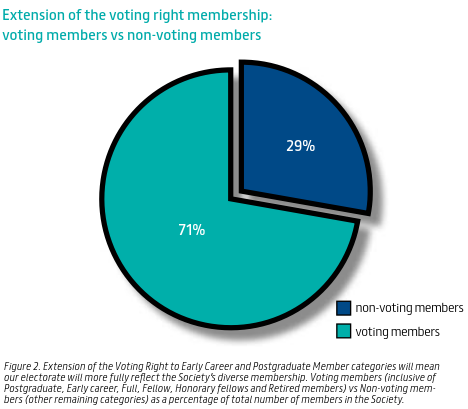Prior to the approval of our proposal, only specific membership categories were given the voting right within the Society; Full Members, Fellows, Honorary Fellows, Retired Members and Retired Fellows. Members in other categories – Undergraduate, Postgraduate, Affiliate and Early Career Members – were not entitled to the voting right.
On 21 June 2016, Aidan Seeley (Young Pharmacologist Trustee) and Teesha Bhuruth (Membership & Community Officer) presented a proposal on behalf of the Young Pharmacologists Advisory Group (YPAG) to Council, which to our delight has been approved! This means that with immediate effect both Early Career and Postgraduate Members have the right to vote.
In previous years members of YPAG were not entitled to sit on Council. However, last year Council extended their membership to Young Pharmacologists. Aidan Seeley, who sits on Council volunteered to present a proposal (co-written with Teesha Bhuruth) to allow extension of the voting right to Early Career and Postgraduate Members.

What entitlements and responsibilities are associated with the voting right?
- Vote in elections to appoint Society officers (President-Elect, Treasurer-Elect), Trustees and Vice President roles.
- Vote in resolutions: typically to change the Articles of the Society and to appoint auditors.
- Eligibility to self-nominate for Society officer position (Young Pharmacologist Trustee).
- Be a member within the meaning of the Companies Act.
- Be liable to pay up to £1 as a contribution to the Society’s debts if it dissolves (10.2 Articles).
This extension of the voting right to Early Career and Postgraduate Members will have a positive impact on the Society. Prior to the approval of the proposal by Council, the proportion of voting members to non-voting members was 54% to 46%, and the voting group comprised only 23% female members. The Society has a commitment to ensure at least a 30% female representation on committees and groups.

The extension of the Voting Right to include Early Career and Postgraduate Members has increased the proportion of voting members to 71%, increasing the female representation in the voting category to 30%. This demonstrates that the Society has increased equality and diversity amongst its members, and our electorate will more fully reflect the Society’s diverse membership. There will be more engagement amongst younger members with the Society’s activities and discussions, which will allow the Society to build a stronger pharmacological community. Previous research confirms that both Early Career and Postgraduate Members are keen to learn more about the Society’s discussions and to be involved in the decisions made by the Society during the Annual General Meetings.
Although, Early Career and Postgraduate Members have been given the Voting Right, it is important to highlight that they will not be eligible to self-nominate for Senior Society Officer roles (President-elect, Treasurer-elect), Vice-President and Trustee positions (with the exception of the Young Pharmacologist Trustee role).
By granting us the Voting Right, we would like to thank Council on behalf of Early Career and Postgraduate Members for recognising our commitment and enthusiasm to achieve the Society’s vision.
More from Young pharmacologists
Comments
If you are a British Pharmacological Society member, please
sign in to post comments.